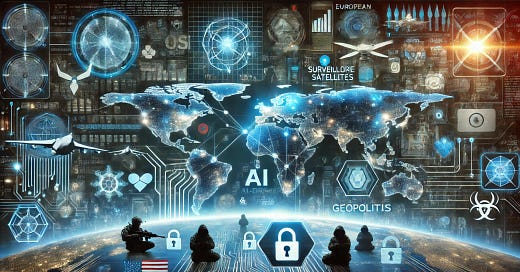AI and Cybersecurity in Geopolitics in the 21st Century
"The Geopolitical Battlefield of AI and Cybersecurity: Power, Threats, and Global Strategy"
Introduction
Artificial intelligence (AI) and cybersecurity have emerged as significant battlegrounds in the 21st-century geopolitical landscape. Nations are leveraging AI for strategic advantages in military, economic, and political realms. Simultaneously, cybersecurity threats have become a primary concern, shaping global power dynamics. This article explores how AI and cybersecurity intersect with geopolitics, impacting national security, economic competition, and global governance.
Strategic Importance
Military and Defense Applications
AI is revolutionizing modern warfare through surveillance, autonomous weapons, and strategic decision-making. Countries like the United States, China, and Russia are heavily investing in AI-driven military technologies to gain battlefield superiority. The integration of AI in defense systems raises ethical concerns, particularly regarding compliance with international laws on autonomous weapons.
Economic Competition
AI-driven innovations fuel economic power, with leading nations in AI research and development (R&D) dominating industries such as finance, healthcare, and automation. The intense competition between AI superpowers like the United States and China influences global trade and technology regulations. The AI arms race raises concerns about technical monopolies and digital colonialism, where certain nations control critical AI infrastructure and resources.
Political Influence and Governance
AI is reshaping politics through data-driven governance, election interference, and social media manipulation. Countries are using AI for population monitoring and control, sparking debates on privacy, digital rights, and state surveillance. The governance of AI remains a contentious issue in international politics, encompassing regulatory frameworks and ethical considerations.
Cybersecurity as a National Security Imperative
Cyber Warfare and Espionage
Cyberattacks have become a favored tool for nation-states to disrupt rival economies, steal sensitive data, and weaken adversaries. Countries like the US, Russia, China, Iran, and North Korea engage in cyber espionage activities targeting government agencies, corporations, and critical infrastructure. The rise of ransomware attacks and state-sponsored hacking groups has heightened tensions among global powers.
Protection of Critical Infrastructure
The increasing digitization of essential services, such as power grids, financial systems, and healthcare, has made critical infrastructure vulnerable to cyber threats. Governments prioritize cybersecurity measures to safeguard national security, implementing initiatives like Zero Trust Architecture and AI-driven threat detection systems. AI plays a crucial role in enhancing cybersecurity by detecting threats, identifying vulnerabilities, and responding to cyber events in real time. However, cybercriminals are leveraging AI to develop more sophisticated attacks, leading to an ongoing cat-and-mouse game between cybersecurity professionals and malicious actors.
Global Division in AI and Cyber Security
US-China Rivalry
The US and China lead the AI and cybersecurity races with differing approaches. The US emphasizes private sector innovation, while China focuses on state-led AI development. This competition has resulted in technology export bans, trade wars, and the decoupling of AI ecosystems, particularly in semiconductor manufacturing and AI chip development.
Europe's Approach to AI Regulation
The European Union (EU) positions itself as a global leader in AI regulation and ethical governance. The EU's Artificial Intelligence Act aims to ensure that AI development aligns with human rights and transparency. Europe's cybersecurity policies, including the General Data Protection Regulation (GDPR), serve as a model for global data security standards.
Emerging Players in AI and Cyberspace
Other nations like India, Israel, and South Korea are investing in AI and cybersecurity to secure their digital sovereignty. India focuses on AI for economic growth, Israel excels in cybersecurity innovation, and South Korea emphasizes AI ethics in technological advancements.
AI and the Future of Geopolitics
International Cooperation and Conflict
The global AI and cybersecurity landscape features both cooperation and conflict. Initiatives like the Global Partnership on AI (GPAI) and the Paris Call for Trust and Security in Cyberspace aim to promote international collaboration. However, ideological divisions, concerns over digital sovereignty, and cyber conflicts pose significant challenges to global stability.
Ethical and Legal Considerations
Strong governance is essential to address the moral implications of AI, the misuse of surveillance, and human rights concerns. Developing international cybersecurity laws and AI ethics guidelines is crucial to mitigate risks associated with technological advancements.
Technological Progress and Policy Adaptation
As AI and cybersecurity evolve, policymakers must adapt to emerging threats and opportunities. Governments need to balance innovation, regulation, and security to navigate the complex geopolitical landscape of AI and cybersecurity.
Conclusion
AI and cybersecurity geopolitics are shaping the future of global power structures. As nations compete and cooperate in these critical domains, the impact on military strategies, economic competition, and digital governance will deepen. International cooperation, ethical AI development, and robust cybersecurity policies are essential to ensuring a secure and equitable digital future.
Stay Ahead in the AI & Cybersecurity Race!
Geopolitics is evolving fast—don’t get left behind. Subscribe to my Substack for in-depth analysis on AI, cybersecurity, and the future of global power. Join the conversation and stay informed! Subscribe now.





The intersection of AI and cybersecurity is reshaping global power dynamics faster than ever. As nations compete for dominance in these fields, the stakes for national security, economic leadership, and digital governance continue to rise. What are your thoughts on the future of AI-driven warfare and global cybersecurity regulations? Let’s discuss!"